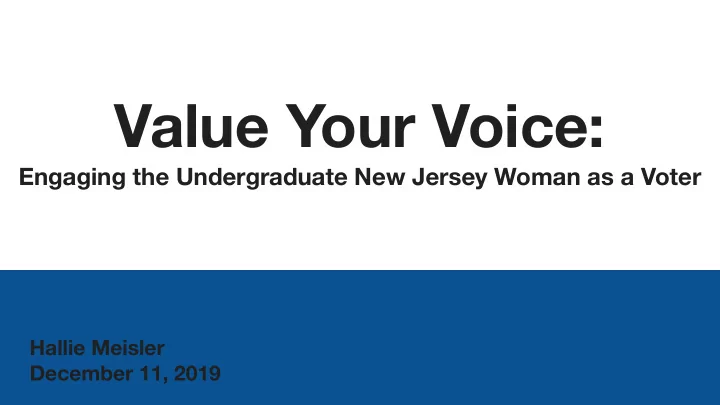

Value Your Voice: Engaging the Undergraduate New Jersey Woman as a Voter Hallie Meisler December 11, 2019
The Leadership Scholars Certificate Program is a two-year selective, interdisciplinary certificate program that prepares Rutgers undergraduate women to be informed, innovative, and socially responsible leaders. Leadership Scholars design and implement social action projects to expand their understanding of issues and problems and to develop leadership skills. This project gives Scholars the opportunity to apply the theoretical knowledge they have gained about leadership, advocacy, and social change with the practical and experiential knowledge they have developed about a particular policy issue or problem through the field site placement. It also further develops leadership skills by giving undergraduates the opportunity to practice leadership through action. To find out more please visit the Institute for Women’s Leadership’s website at http://iwl.rutgers.edu.
Mission Statement To address the critical issue of disengagement among undergraduate women in the political process with the goal of increasing voter registration, turnout, and the need to civically participate as a young women on the Rutgers campus. Fig. 1. Rutgers Woman Voting (NJSpotlight))
Gender and Civic Engagement Beauvais, E. (2019). The Gender Gap in Political Discussion Group Attendance. Politics & Gender , 1-24. Doi: 10.1017/s1743923x18000892 Stock, D. M. (2012). Making politics personal: Leadership programs as a tool for developing political interest and efficacy in Fig. 2. Women in Politics. (I Know Politics). young women (Order No. 3504385).
Personal is Political Shames, S. (2014). Making the Political Personal: A Challenge for Young Women. Politics & Gender , 10 (02), 287-292. doi: 10.1017/s1743923x14000117 Stock, D. M. (2012). Making politics personal: Leadership programs as a tool for developing political interest and efficacy in young women (Order No. 3504385). Fig 3. Personal Voting. (Huff Post).
Voting on Rutgers Campus ❖ 42.8% - voting rate in 2018 ❖ 33.7% - voting rate of 18-21 year olds ❖ 42% of women voted in 2010 ❖ 3 lowest voting majors - math and statistics, business marketing and management, and liberal arts and sciences. Fig 4. NSLVE Data. (IDHE).
Voter Registration Efforts Fig. 5-7. Voter Registration (CYPP).
Value Your Voice Panel Event Fig. 8-9 Event.
Value Your Voice: Promoting Feminist Leadership Fig. 10. Q&A.
Lessons Learned and Insights Gained Ask for help ❖ Have a plan b and be ❖ ready to roll with many obstacles Be okay with imperfection ❖ Be proud of both small ❖ and large victories Difficulty of event planning ❖ Outreach ❖ Get what you put into it ❖ Self advocacy and ❖ promotion Fig. 11. Event Poster
Value Your Voice: The Future Voting in 2020 ❖ Encouraging lifelong ❖ voters Repurpose this event ❖ for 2020 Continued need to ❖ increase voter registration and voter turnout rate Fig. 12. Pre-Election.
Bibliography Beauvais, E. (2019). The Gender Gap in Political Discussion Group Attendance. Politics & Gender , 1-24. doi: 10.1017/s1743923x18000892 Goldmacher, S., & Bui, Q. (2019). Biden Goes Old. Sanders Goes Young. Warren Is in Between. What Facebook Ads Reveal About 2020. Retrieved 14 October 2019, from https://www.nytimes.com/interactive/2019/10/14/us/politics/democrats-political-facebook-ads.html Institute for Democracy and Higher Education (2019). Student Voting Rates for Rutgers- University New Brunswick . National Study of Learning, Voting, and Engagement. Tufts University, pp.1-13. Jenkins, K. (2005). Gender and Civic Engagement: Secondary Analysis of Survey Data (pp. 1-16). The Center for Information and Research on Civic Learning and Engagement. Mariani, M., Marshall, B., & Mathews-Schultz, A. (2015). See Hillary Clinton, Nancy Pelosi, and Sarah Palin Run? Party, Ideology, and the Influence of Female Role Models on Young Women. Political Research Quarterly , 68 (4), 716-731. doi: 10.1177/1065912915605904 Pfanzelt, H., & Spies, D. (2018). The Gender Gap in Youth Political Participation: Evidence from Germany. Political Research Quarterly , 72 (1), 34-48. doi: 10.1177/1065912918775249 Raychaudhuri, D. (2019). The new face of N.J. voters? Young and female, new data shows. Retrieved 25 November 2019, from https://www.nj.com/data/2019/05/this-is-the-emerging-face-of-the-nj-electorate-new-data-shows.html Shames, S. (2014). Making the Political Personal: A Challenge for Young Women. Politics & Gender , 10 (02), 287-292. doi: 10.1017/s1743923x14000117 Stock, D. M. (2012). Making politics personal: Leadership programs as a tool for developing political interest and efficacy in young women (Order No. 3504385). Available from ProQuest Dissertations & Theses Global. (1011481343). Retrieved from https://search-proquest-com.proxy.libraries.rutgers.edu/docview/1011481343?accountid=13626 Thomas, N, et al. (2018). Election Imperatives: Ten Recommendations to Increase College Student Voting and Improve Political Learning and Engagement in Democracy. (pp. 1-19). Tufts University: Institute for Democracy and Higher Education.
Recommend
More recommend